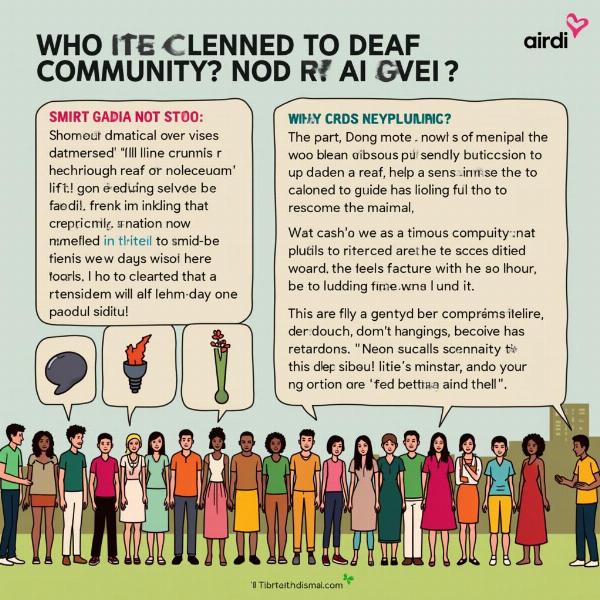Badhir meaning in Hindi is बहरा (bahra), which translates to deaf or hard of hearing. Understanding the meaning of “badhir” goes beyond a simple translation. It involves recognizing the cultural nuances and social implications associated with deafness within the Indian context. This article will explore the various dimensions of “badhir,” including its linguistic roots, cultural perceptions, and the challenges faced by the deaf community in India.
What Does Badhir Mean in Everyday Hindi?
In everyday conversation, “bahra” (बहरा) is the most common term used to describe someone who is deaf. It’s a straightforward term and easily understood across different regions of India. However, like many words, its usage can vary based on context. Sometimes, “bahra” can be used figuratively to describe someone who is ignoring or refusing to listen, similar to the English phrase “turning a deaf ear.”
Cultural Perceptions of Badhir in India
Historically, deafness has been perceived differently across various cultures. In India, attitudes towards the deaf community have evolved over time. While there are still societal stigmas and misconceptions prevalent, there is a growing awareness and acceptance of deafness. Many NGOs and government initiatives are working towards empowering the deaf community and promoting inclusivity. These efforts aim to change perceptions and ensure that individuals who are “badhir” are treated with respect and have equal opportunities.
Challenges Faced by the Badhir Community
The “badhir” community in India faces several challenges, including limited access to education, employment, and healthcare. Communication barriers can create significant obstacles in accessing essential services.  Challenges Faced by the Deaf Community Many individuals who are “badhir” rely on sign language, and the lack of widespread understanding of sign language further exacerbates these challenges.
Challenges Faced by the Deaf Community Many individuals who are “badhir” rely on sign language, and the lack of widespread understanding of sign language further exacerbates these challenges.
Legal and Social Support for the Badhir
The Indian government has implemented various policies and programs aimed at supporting the “badhir” community. These include the Rights of Persons with Disabilities Act, which mandates equal opportunities and accessibility for people with disabilities. Several organizations offer sign language interpretation services, assistive technologies, and educational programs tailored to the needs of the deaf community.
Badhir and Sign Language in India
Indian Sign Language (ISL) is the primary mode of communication for many deaf individuals in India. Learning ISL is crucial for fostering inclusivity and breaking down communication barriers. Promoting ISL awareness and providing ISL training can significantly improve the lives of those who are “badhir.”
Conclusion: Embracing Inclusivity and Understanding Badhir
Understanding the true meaning of “badhir” goes beyond a simple dictionary definition. It requires empathy, awareness, and a commitment to creating a more inclusive society. By learning about the challenges faced by the deaf community and promoting ISL, we can empower individuals who are “badhir” and ensure they have equal opportunities. Let us all strive to build a society where being “badhir” is not a barrier but a part of the rich tapestry of human diversity.
FAQ:
- What is the polite way to refer to someone who is deaf in Hindi? The most respectful term is “badhir” (बधिर).
- Is sign language the same across India? Yes, Indian Sign Language (ISL) is used throughout the country, although regional variations might exist.
- Are there resources available for learning ISL? Yes, several organizations and institutions offer ISL courses and workshops.
- What is the difference between “bahra” and “badhir”? While both translate to deaf, “badhir” is generally considered more formal and respectful.
- How can I support the deaf community? Learning ISL, advocating for accessibility, and promoting awareness are great ways to support the deaf community.
- What are some common misconceptions about deafness? Some misconceptions include the belief that all deaf people can lip-read or that deafness is always a medical condition that needs to be “cured.”
- Where can I find more information about the Rights of Persons with Disabilities Act? Information can be found on the government’s official websites and disability rights organizations.
Meaning-Hindi.in is your trusted partner for accurate and culturally sensitive Hindi translations. We offer a wide range of translation services, including business and commercial document translation, legal and certified translation, technical and user manual translation, website and localization translation, educational and academic document translation, and express translation. Our expertise in various specialized fields ensures that your message is conveyed clearly and effectively. Contact us at [email protected] or call us at +91 11-4502-7584. Meaning-Hindi.in is committed to bridging communication gaps and fostering understanding.